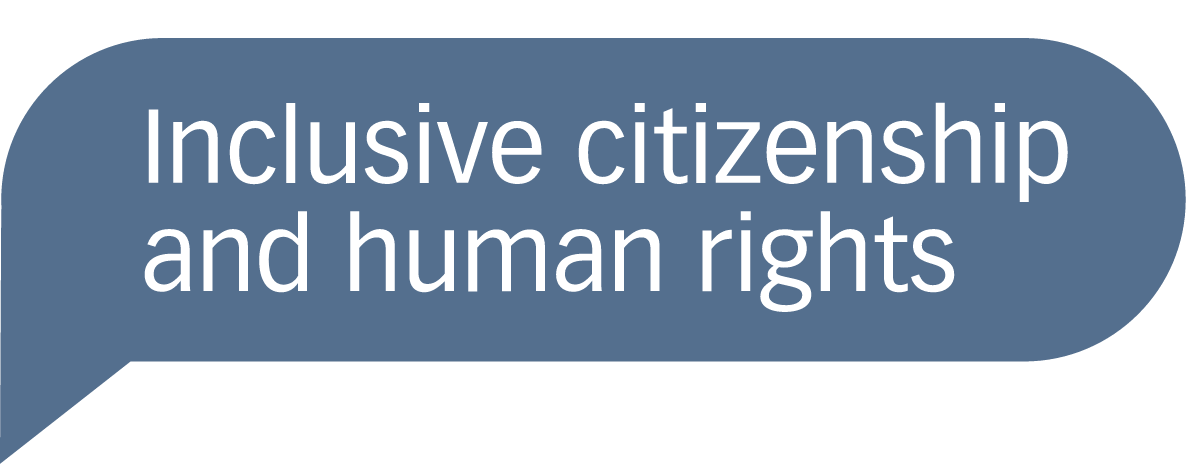
States have discretion in determining the criteria for granting citizenship. These criteria are generally grounded in three fundamental legal principles governing the acquisition of nationality:
- Jus sanguinis (right of blood) – nationality inherited through lineage.
- Jus soli (right of the soil) – nationality granted by birth in a state’s territory.
- Naturalization – nationality acquired through long-term residence or other criteria, such as marriage, etc.
This page examines how states define who belongs and who does not through laws and administrative practices. It explores the deprivation and denial of citizenship, the protections provided under international law, and the impact of statelessness and related human rights challenges.
Arbitrary Deprivation of Nationality
Article 15 of the Universal Declaration of Human Rights (UDHR) provides that, ‘no one shall be arbitrarily deprived of his or her nationality.’
Deprivation or denial of citizenship must not be arbitrary and should instead be in accordance with international human rights standards.
Fernand de Varennes – Arbitrary deprivation of Nationality & Non-Discrimination
- UN Human Rights Council report (A/HRC/13/34) recommends that nationality cannot be arbitrarily removed and that although acquisition or loss of nationality is governed by internal legislation, the regulations are limited to maintain international order.
- UN Human Rights council, Resolution 10/13, recognizes that arbitrary deprivation of nationality, especially on discriminatory grounds such as race, colour, sex, language, religion, political or other opinions, national or social origin, property, birth or another status, constitutes a violation of human rights and fundamental freedoms.
- The UN Human Rights Committee, in its General Comments No. 16 and No. 27 under the ICCPR, interprets ‘arbitrary interference’ to include interferences authorized by law. It emphasizes that such interferences must still align with the aims and objectives of the Covenant and must be reasonable in the particular circumstances.
Nationality as a Right under International Law
International law does not necessarily impose a state mandate towards nationality. However, it is recognized as an inherent right and a basic requirement for the exercise of political rights and for an individual’s legal capacity. The right to nationality has been described as the right to have rights.
Under Article 15(1) of UDHR, “everyone has a right to a nationality” and “No one shall be arbitrarily deprived of his nationality nor denied the right to change his nationality.” With this article, the UDHR is establishing a core legal relationship between the individual and the state. An individual’s legal bond with a State via citizenship often establishes an essential prerequisite to enjoyment and protection of a full range of human rights. Although a soft law, it has been widely accepted as customary international law that articulates a universal standard of human rights and all States are expected to uphold, at minimum, by ensuring respect for core human rights obligations.
Several international human rights treaties affirm the right to nationality. Article 24(3) of the International Covenant on Civil and Political Rights (ICCPR) recognizes every child’s right to acquire a nationality. While states are not explicitly obligated to grant nationality, they must adopt measures, guided by non-discrimination principles, to protect this right. Furthermore, ICCPR Article 12, through its broad interpretation of “one’s own country,” reinforces the right to stay in a country where an individual has special ties.
The Convention on the Rights of the Child (CRC) strengthens this framework. Article 7 mandates birth registration and the right to acquire nationality, emphasizing state responsibility to prevent statelessness, especially for children. States are encouraged to adopt jus soli principles where necessary and ensure nationality laws are non- discriminatory. Article 3 of CRC further requires states to prioritize the best interests of the child in nationality-related decisions.
Other key treaties include CEDAW (Convention on the Elimination of All Forms of Discrimination Against Women), which guarantees women’s equal rights in acquiring, changing, or retaining nationality (Article 9). The 1961 Convention on the Reduction of Statelessness prohibits arbitrary or discriminatory deprivation of nationality, particularly where it results in statelessness.
The fundamental nature of the right to a nationality has been consistently reaffirmed by the United Nations General Assembly (for example, A/RES/50/152) and the United Nations Human Rights Council (for example, A/HRC/RES/7/10; A/HRC/RES/10/13; A/HRC/RES/13/2; A/HRC/RES/20/5; A/HRC/RES/26/14).
In conclusion, nationality extends beyond mere formal recognition by a state; it is also inherently acknowledged as a basic human right.
This project particularly discuss the denial of citizenship of Rohingyas in Myanmar and citizenship determination processes in Assam, India that disproportionately impact Bengali speaking Muslims.
Disproportionate Impact on Women
International human rights standards oblige State Parties to guarantee women equal rights to acquire, change, or retain their nationality. However, in practice, some countries continue to apply gender-discriminatory nationality laws or administrative procedures that can result in the deprivation of nationality, often through unequal access to documentation and verification processes.
Shardul Gopujkar – A Gender Perspective: FT Process in Assam
Statelessness
Statelessness is a highly vulnerable condition that leaves individuals exposed to arbitrary treatment and denial of basic rights. It may result from a range of factors, including discriminatory laws, gaps in citizenship legislation, state dissolution or succession, or the arbitrary deprivation or exclusion from citizenship.
• De jure Stateless – A stateless person ‘who is not considered as a national by any State under the operation of its law’ (Article 1 of the 1954 Convention Relating to the Status of Stateless Persons)
• De facto stateless – Where such persons are persons outside the country of their nationality who are unable or, for valid reasons, are unwilling to avail themselves of the protection of that country. (UNHCR, Handbook on Protection of Stateless Persons, 2014)
• In Situ Statelessness – Refers to people born or residing in their country of residence who are denied or deprived of nationality, leaving them stateless within the borders of their own country, despite their strong connection to it, often due to discrimination, gaps in nationality laws, or administrative barriers.
Statelessness & Minorities
It is important to address statelessness within the broader context of minority rights. More than 75% of the world’s known stateless population belong to minority groups. Another critical dimension associated with statelessness is its gendered impact.
Fernand de Varennes – Statelessness and its Impact on Minority Religions
Fernand de Varennes – The Gender Perspective on Statelessness
Other Consequences
Indefinite detention
In situations where an individual’s citizenship status is uncertain, particularly as a stateless person, they are at heightened risk of being subjected to prolonged or even indefinite detention. The lack of citizenship prevents both legal recognition and removal. Such is the situation we see both in Assam, India and Myanmar.
Refugee situation
Statelessness does not automatically grant refugee status. However, the lack of citizenship increases vulnerability to persecution and displacement. Many are forced to seek asylum or refugee protection. The Rohingya are among the world’s largest stateless populations. Over a million, mostly women and children, have taken refuge in neighbouring countries such as Bangladesh, India, and Thailand. Read more about the intersecting challenges they face here.
Genuine Connection
Nationality is not merely a legal status conferred by birth or formal recognition; it also reflects an individual’s genuine connection or special ties to a country.
Each of the three primary legal principles of citizenship acquisition (as highlighted in the beginning of this page) assumes a certain degree of connection to the state. However, scholars such as Bauböck et al. propose a fourth conception of citizenship grounded in genuine links. It emphasizes an individual’s special connection to a country rather than mere birth or descent, a principle also reflected in international law.
Neha Philip – The Assam case and the Rohingya case: A comparison
The International Court of Justice (ICJ) affirmed the importance of genuine connection in the Nottebohm Case (1955), stating that nationality should reflect a real and effective bond between the individual and the State. Similarly, in the Haitian Expulsion Case, the Inter-American Court of Human Rights (IACtHR) recognized that long-term residents who establish deep ties in a country should not be treated as transients but as individuals with legitimate claims to nationality. The Human Rights Committee (HRC) General Comment No. 27, interpreting Article 12(4) of the ICCPR, expands the concept of “own country” beyond formal nationality. It acknowledges that individuals with special ties to a country, such as long-standing residence, family connections, or socio-economic integration, should have a right to enter and remain in that country, even if they lack formal citizenship. This interpretation is particularly relevant for stateless persons and those arbitrarily deprived of nationality.
Recognizing nationality based on genuine ties is in line with international human rights standards. It guarantees that individuals who have established their lives in a country are not deprived of their fundamental rights. By adopting the principle of genuine connection, states can uphold the right to nationality, ensuring that citizenship is granted not solely by law but through real, meaningful relationships between individuals and the nation-state they call home.
Reflective Question:
When you hear the term “statelessness,” what kinds of vulnerabilities come to mind? How do the Rohingya case studies illustrate these vulnerabilities?
Related Resources
Find digital tools produced in cooperation with partners and researchers from different regions.
Coverphoto: by Andrew Renneisen/Getty Images



